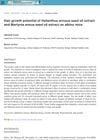 6 citations,
January 2022 in “Journal of Investigative Dermatology”
6 citations,
January 2022 in “Journal of Investigative Dermatology” Male pattern baldness is linked to higher levels of a certain receptor in the scalp, which leads to the shrinking of blood vessels and hair loss. Early treatment targeting this receptor could be more effective.
6 citations,
September 2021 in “Autophagy” Autophagy prevents early aging and maintains lipid and pheromone balance in mouse glands.
5 citations,
May 2022 in “Clinical & Experimental Metastasis” Minoxidil and ranolazine together can reduce the spread of certain breast cancer cells.
5 citations,
March 2022 in “Frontiers in Cell and Developmental Biology” Colostrum-derived exosomes can promote hair growth and may be a promising treatment for hair loss.
 5 citations,
June 2017 in “in Vivo”
5 citations,
June 2017 in “in Vivo” Vitamin C deficiency changes gene expression, affecting skin and hair health.
 4 citations,
January 2022 in “Yonsei Medical Journal”
4 citations,
January 2022 in “Yonsei Medical Journal” Microneedles are a promising method for drug delivery, offering efficient and convenient alternatives with fewer side effects.
4 citations,
October 2021 in “Microorganisms” Men with androgenetic alopecia have different scalp oils and microbes compared to those without.
 4 citations,
August 2021 in “Frontiers in Cell and Developmental Biology”
4 citations,
August 2021 in “Frontiers in Cell and Developmental Biology” Stress can cause hair loss by affecting nerve-related hair growth, and noradrenaline might help prevent this.
4 citations,
February 2018 in “EMBO reports” New DNA analysis and machine learning are advancing forensic science, improving accuracy and expanding into non-human applications.
 3 citations,
March 2022 in “Polymers”
3 citations,
March 2022 in “Polymers” Substances from Ascidian tunics might help treat hair loss as effectively as Minoxidil.
 3 citations,
November 2021 in “Frontiers in Genetics”
3 citations,
November 2021 in “Frontiers in Genetics” Certain genes are linked to the quality of cashmere in goats.
3 citations,
June 2021 in “Frontiers in genetics” The protein STAT3 slows down cell growth by blocking the FST gene, which affects hair development in sheep.
3 citations,
January 2021 in “Oxidative Medicine and Cellular Longevity” Nrf-2-modified stem cells from hair follicles significantly improve ulcerative colitis in rats.
 3 citations,
August 2020 in “Nutrition Journal”
3 citations,
August 2020 in “Nutrition Journal” Spinach-derived thylakoid supplements plus a low-calorie diet helped obese women with polycystic ovary syndrome lose weight and improve their metabolism.
 3 citations,
May 2018 in “Journal of nutritional health & food science”
3 citations,
May 2018 in “Journal of nutritional health & food science” Nutritional supplements can help manage hair loss and promote hair growth by strengthening hair roots and countering harmful effects of pollution, smoking, and deficiencies in vitamins and minerals.
 3 citations,
March 2015 in “Biomolecules & Therapeutics”
3 citations,
March 2015 in “Biomolecules & Therapeutics” Phospholipids from pig lungs can significantly promote hair growth.
2 citations,
April 2023 in “Polymers” The study created 3D-printed pills that effectively release a hair loss treatment drug over 24 hours.
 2 citations,
January 2023 in “BMC plant biology”
2 citations,
January 2023 in “BMC plant biology” Scientists found new genetic areas that affect how rice root hairs grow and develop.
 2 citations,
November 2022 in “BioMed Research International”
2 citations,
November 2022 in “BioMed Research International” Baicalin may help treat hair loss by promoting hair follicle growth and activating specific cellular pathways.
2 citations,
August 2022 in “Middle East Fertility Society Journal” The new rodent model successfully mimics non-lean human PCOS symptoms.
 2 citations,
January 2022 in “Stem cell biology and regenerative medicine”
2 citations,
January 2022 in “Stem cell biology and regenerative medicine” Extracellular vesicles, including exosomes from certain cells, can stimulate hair growth.
2 citations,
February 2021 in “Case reports in dermatological medicine” The new topical botanical formulation significantly regrew hair in all five patients without side effects.
 1 citations,
March 2024 in “International Journal of Pharmaceutical Sciences and Drug Research”
1 citations,
March 2024 in “International Journal of Pharmaceutical Sciences and Drug Research” Helianthus annuus and Martynia annua seed oils significantly promote hair growth.
 1 citations,
January 2024 in “Journal of plastic, reconstructive & aesthetic surgery”
1 citations,
January 2024 in “Journal of plastic, reconstructive & aesthetic surgery” Stem cell-derived conditioned medium is effective in improving hair density and thickness for alopecia treatment.
1 citations,
December 2023 in “International journal of molecular sciences” miR-199a-3p controls hair growth and is linked to alopecia areata.
1 citations,
March 2023 in “Pharmaceutics” PBMCsec can help reduce and improve thick skin scars.
 1 citations,
March 2023 in “Science Translational Medicine”
1 citations,
March 2023 in “Science Translational Medicine” Blocking a certain signal in the gp130 receptor can improve tissue healing and lessen osteoarthritis symptoms.
 1 citations,
December 2022 in “Archives of Dermatological Research”
1 citations,
December 2022 in “Archives of Dermatological Research” Acne treatment with isotretinoin increases the presence of p53, a protein, in skin and oil glands, which may help reduce acne severity.
 1 citations,
March 2022 in “The Scientific World Journal”
1 citations,
March 2022 in “The Scientific World Journal” The cream made from cocoa pod peel can promote hair growth but may cause skin irritation.
 1 citations,
January 2022 in “Journal of Pharmaceutical Sciences”
1 citations,
January 2022 in “Journal of Pharmaceutical Sciences” The new skin cream with FOL-005 safely promotes hair growth and is stable and user-friendly.

















